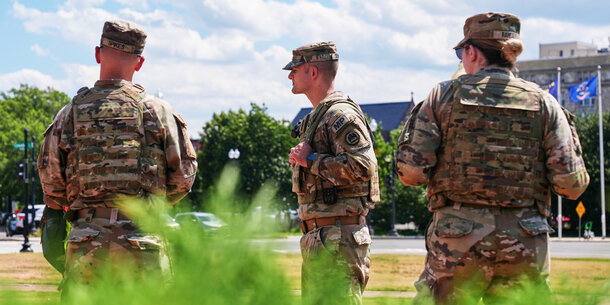You’re reading The Briefing, Michael Waldman’s weekly newsletter. Click here to receive it in your inbox.
President Trump announced last week that the Department of Defense should now be called the Department of War, which he said “sends a message of strength.”
The rebranded agency’s alleged first target? Chicago.
On Saturday, Trump stated in a Truth Social post, “Chicago about to find out why it’s called the Department of WAR.” The post included a bizarre, AI-generated image featuring Trump sitting in front of a burning Chicago surrounded by helicopters, explosions, and the phrase “Chipocalypse Now,” in the style of the Vietnam War film.
Trump has since walked back his threat, but let’s not shrug this off as merely a provocative meme. A sitting president . . . threatening war on an American city . . . as National Guard members from additional states stand by ready to be sent in . . . over state leaders’ objections. “This is not a joke,” as Gov. JB Pritzker declared. It’s a direct challenge to our constitutional order. And it substitutes provocation for crime-fighting strategies, locally led and nationally supported, that we know work best to protect the public.
When the Constitution was ratified, the founders worried about a moment like this. They were deeply afraid of an unchecked, nationally controlled military. The British Army had sailed away just five years before.
Opponents of the Constitution noted with alarm that militias from one state could be marched into another. At the Constitutional Convention, Elbridge Gerry warned of the risks of “letting loose the myrmidons of the United States on a state without its own consent.” During ratification fights, Patrick Henry and George Mason cautioned that the federal government could march Virginia’s militia out of state and send some other state’s military in. (In that case, they worried that the federal government could threaten slavery.)
That fear of federalized state militias, in fact, is one of the reasons we have the Second Amendment. It aimed to ensure that states could keep fully armed their own “well-regulated militia,” now known as the National Guard.
As CNN journalist Ron Brownstein put it, “The idea of armed troops in multiple American cities, whatever the justification, is fundamentally alien from the American tradition. We have not seen troops in U.S. cities except at the moments of greatest civil disorder.”
It’s why still today, the Posse Comitatus Act explicitly prohibits federal troops from engaging in civilian law enforcement, with few exceptions. Soldiers are trained to defeat a foreign army, not to make arrests or patrol streets. Inserting the armed forces into routine civilian law enforcement also pulls personnel, resources, and attention away from the military’s core national security responsibilities. This is simply not the military’s job.
To be sure, federal law allows the president to deploy the military to suppress insurrections or to execute federal law in a crisis when civilian authorities are either entirely overwhelmed or complicit in the violation. However, Trump makes no secret of his desire to use the National Guard to police local crime — a matter of state and local responsibility over which the federal government has no authority, let alone the military. There is no lawful basis for Trump sending in the National Guard or federal agents to police crime in Chicago.
To be clear: Public safety is vital, and crime indeed spiked during the pandemic. Chicago, in particular, has a long-standing problem of violent crime. But in recent years, crime has subsided in most parts of the country. The latest FBI statistics show the steepest drop in both violent crime and property crime in a single year since the 1960s. Proven solutions have worked to reduce crime in cities across the country. Chicago and other cities, including Baltimore and New York, have seen sharp drops in violent crime due to a variety of programs supporting local law enforcement and promoting public safety, many of which have been funded by the federal government.
Where are those programs today? The Trump administration has been gutting them, amounting to $820 million in cuts to public safety funding. To truly help fight crime, Trump would fund programs that work and end this flashy, ostentatious showdown. The answer is to support the police and bolster strategies that work, not send in the troops.
The potential pitting of state against state reflects a deeper, dangerous shift.
According to Pritzker, Trump hopes to deploy the Texas National Guard in Illinois. Gov. Greg Abbott denies this, but his office has said that Texas’s Guard is “willing and ready” to jump into action. If Texas or other states do send troops to Chicago, it would indicate a dramatic fracture of the social contract among states — one that would likely violate the Constitution, as the Brennan Center has argued.
In the past decade, conservative states increasingly flaunted federal authority. Mississippi banned abortion even when Roe v. Wade was on the books. Texas enacted a “bounty hunter” law to try to achieve the same goal.
Now liberal states are striking out on their own. States are combining to produce new vaccine safety recommendations, bypassing federal abandonment of this key public health concern. Some states rush to pass laws to protect reproductive health care providers, while other states seek to prosecute those same out-of-state professionals.
And of course, provoked by Texas, both Democratic- and Republican-led states are now competing to squeeze out more congressional seats through an endless, retaliatory cycle of partisan gerrymandering.
The United States grew into a great and prosperous power as it developed a continent-wide economy, with a strong national government enforcing rights across the country. But in recent years, the Supreme Court has increasingly refused to set national standards (as when it repealed the constitutional right to abortion care). And an increasingly dysfunctional Congress has failed to act (as when arcane filibuster rules prevented congressional majorities from enacting voting rights protections in 2022).
Now we are seeing the development of two separate social systems in red and blue states. I don’t think that is the interpretation of states as “laboratories of democracy” that Justice Louis Brandeis had in mind. At some point, the country will need to be held together.
It’s sensible to seek new solutions to age-old problems. But let’s not be fooled: Sending the military into the streets to interfere in civilian law enforcement is an un-American idea that only threatens to upend our civil rights and fuel divisions among states.
During the Constitutional Convention, James Madison predicted, “The means of defense against foreign danger have been always the instruments of tyranny at home.”






